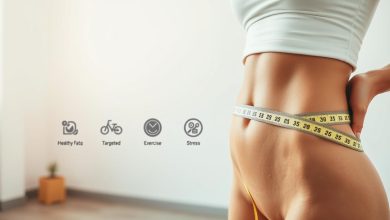Beginner’s Gym Workout Routine Get Fit Fast

Embarking on a fitness journey can be both exciting and intimidating, especially for those new to exercising. A well-structured gym workout routine is essential for achieving fitness goals quickly and safely.
Creating an effective beginner gym workout plan involves understanding the basics of exercise and how to apply them to your lifestyle. This introduction will cover the importance of a tailored approach to help you get fit fast.
Key Takeaways
- A well-structured gym workout routine is crucial for beginners.
- Understanding your fitness goals is key to creating an effective plan.
- A beginner gym workout plan should be tailored to your lifestyle.
- Consistency and patience are vital for achieving fitness goals.
- A good workout routine helps in getting fit quickly and safely.
Understanding the Basics of Fitness
Embarking on a fitness journey requires a solid grasp of the basics. For those new to the gym, it’s essential to understand the fundamental elements that make up a successful workout routine. This knowledge not only helps in achieving fitness goals but also in maintaining a safe and effective exercise regimen.
What is a Gym Workout Routine?
A gym workout routine is a structured plan that outlines the exercises you will perform during your gym sessions. It is tailored to help you achieve your specific fitness goals, whether it’s weight loss, muscle gain, or overall fitness. A well-designed routine includes a mix of cardio exercises, strength training, and flexibility workouts. For newcomers, starting with easy gym exercises can make the journey less intimidating and more enjoyable.
Importance of Consistency
Consistency is key to seeing results from your workout routine. Regular exercise helps build habits and ensures that you are making progressive gains towards your fitness goals. It’s not just about showing up to the gym; it’s about sticking to your routine over time. Creating a schedule and sticking to it can significantly enhance your progress.
Setting Realistic Fitness Goals
Setting realistic fitness goals is crucial for maintaining motivation and tracking progress. Goals should be specific, measurable, achievable, relevant, and time-bound (SMART). Whether your goal is to lose weight, build muscle, or simply feel healthier, having a clear target in mind helps guide your workout routine. A simple workout routine for newbies often starts with achievable goals, which are gradually increased as fitness levels improve.
By understanding these basics, individuals can create a simple and effective workout plan that suits their needs and lifestyle. This foundation is essential for a successful and sustainable fitness journey.
Essential Equipment for Beginners
The right equipment can make all the difference for beginners starting their fitness journey. Having the appropriate gear not only enhances the effectiveness of a workout but also boosts confidence and motivation.

Must-Have Gym Gear
For those starting a workout regimen at the gym, certain equipment is considered essential. These include:
- A good pair of gym shoes for support and stability
- Comfortable clothing that allows for a full range of motion
- A water bottle to stay hydrated throughout the workout
- A fitness tracker or smartwatch to monitor progress
As emphasized by fitness experts, “Investing in quality gym gear can significantly impact one’s ability to stick to a workout routine.”
Affordable Home Workout Alternatives
Not everyone may have access to a gym or prefer working out at home. Fortunately, there are affordable home workout alternatives that can be just as effective. These include:
- Resistance bands for strength training
- A yoga mat for flexibility and balance exercises
- Dumbbells or adjustable weights for strength training
- A jump rope for cardio workouts
As noted by a fitness enthusiast, “Home workouts can be just as effective as gym workouts if you have the right equipment and a solid plan.”
When choosing equipment, whether for the gym or home, it’s crucial to consider your basic fitness routine for beginners and goals. This ensures that you’re investing in gear that will support your fitness journey effectively.
Warming Up: Why It’s Crucial
A proper warm-up is the foundation of a successful workout, enhancing performance and reducing injury risk. As emphasized by fitness experts, a well-structured warm-up routine prepares the body for physical activity, making it an indispensable part of any beginner’s gym workout routine.

Key Benefits of Warming Up
Warming up offers several benefits that can significantly impact your workout. It increases blood flow to the muscles, reducing the risk of strains and pulls. Moreover, a good warm-up boosts your heart rate and metabolism, preparing your body for more intense activities.
According to a study published in the Journal of Sports Sciences, a proper warm-up can improve muscle performance and reduce the risk of injury by up to 50%. As noted by a fitness professional, “A dynamic warm-up that includes movements like jogging, cycling, or jumping jacks can be particularly effective.”
“The right warm-up gets you ready to push your limits and achieve your fitness goals.”
Simple Yet Effective Warm-Up Exercises
Beginners can start with simple exercises that don’t require any equipment. Jumping jacks are an excellent way to get your heart rate up and loosen your muscles. Other effective warm-up exercises include leg swings, arm circles, and torso twists.
- Marching in place
- High knees
- Butt kicks
These exercises should be performed for about 5-10 minutes to adequately prepare your body for the workout ahead.
The Structure of a Beginner Workout Routine
A well-structured workout routine is the backbone of any successful fitness journey. It’s not just about exercising regularly, but also about understanding how to balance different components of your workout to achieve your fitness goals.
Frequency: How Often Should You Work Out?
The frequency of your workouts depends on your fitness goals and current fitness level. For beginners, it’s generally recommended to start with 2-3 times per week and gradually increase the frequency as your body adapts. Consistency is key to seeing progress and avoiding burnout.

Duration: Finding Your Ideal Workout Length
The duration of your workout is another crucial factor. Beginners should aim for workouts that last between 30-60 minutes. This duration allows for an effective warm-up, a substantial workout segment, and a cool-down period. It’s not about spending hours at the gym, but about making the most of your time.
Types of Exercises: Balance Between Cardio and Strength
A balanced workout routine should include a mix of cardio and strength training exercises. Cardio exercises, such as running or cycling, improve heart health and burn calories. Strength training, on the other hand, helps build muscle and boost metabolism. Aiming for a balance between the two will yield the best results. For beginners, it’s advisable to start with bodyweight exercises or light weights and gradually increase the intensity.
To create a beginner-friendly gym workout guide, it’s essential to understand that everyone’s fitness journey is unique. Tailoring your workout routine to your needs, preferences, and goals is crucial for long-term success.
Sample Weekly Workout Plan
To help you get started on your fitness journey, we’ve outlined a sample weekly workout plan that is simple, effective, and easy to follow.
A well-structured beginner gym workout schedule is crucial for achieving your fitness goals. It not only helps in organizing your workouts but also ensures that you’re giving your body the right balance of exercise and rest.
Day 1: Full Body Strength Training
Start your week with a full-body strength training session. This involves exercises that work multiple muscle groups at once, helping you build overall strength and endurance.
- Squats: 3 sets of 10 reps
- Push-ups: 3 sets of 10 reps
- Lunges: 3 sets of 10 reps per leg
- Dumbbell rows: 3 sets of 10 reps
- Plank: 3 sets, holding for 30 seconds each
Day 2: Cardio Focus
Dedicate your second day to cardio exercises. Cardio is essential for improving heart health, burning calories, and enhancing overall fitness.
- Treadmill jogging: 30 minutes at moderate pace
- Cycling: 30 minutes at moderate resistance
- Swimming laps: 20 minutes at a steady pace
Day 3: Rest and Recovery
Rest is a critical component of any workout routine. It allows your muscles to recover and rebuild, making them stronger over time.
On your rest day, consider activities that promote recovery, such as stretching or a leisurely walk.
Repeat Cycle
After completing the first three days of your workout schedule, repeat the cycle for the remaining days of the week. For instance, Day 4 can mirror Day 1, and Day 5 can be another cardio day. Ensure you have rest days in between to avoid overtraining.

By following this beginner gym workout schedule, you’ll be on your way to establishing a consistent fitness routine that promotes progress and recovery.
Proper Exercise Form and Technique
Proper exercise form and technique are the foundation of an effective and safe gym workout routine for beginners. When you start working out, it’s not just about lifting weights or running on the treadmill; it’s about doing so in a way that maximizes results while minimizing the risk of injury.
Importance of Form to Prevent Injuries
Using proper form during exercises is crucial for preventing injuries. When you perform an exercise incorrectly, you put unnecessary strain on your muscles and joints, which can lead to strains, sprains, or more severe injuries. For instance, lifting weights with poor form can put your back at risk. Maintaining good form ensures that you’re targeting the right muscles and reducing the risk of harm.

Tips for Maintaining Good Technique
To maintain good technique, start by understanding the correct form for each exercise. Here are some tips:
- Start Light: Begin with lighter weights to master the technique before increasing the load.
- Focus on Slow Movements: Perform exercises slowly to maintain control and ensure you’re using the correct muscles.
- Seek Guidance: Consider working with a personal trainer or fitness coach who can provide feedback on your form.
- Use Mirrors: Train in front of a mirror to observe your form and make adjustments as needed.
- Practice Regularly: Consistency is key. The more you practice with proper form, the more it becomes second nature.
By focusing on proper exercise form and technique, you can enhance the effectiveness of your gym workout routine for beginners and ensure a safe progression towards your fitness goals.
Cool Down and Stretching Exercises
Cooling down and stretching are crucial steps in any workout routine that newcomers should not overlook. These exercises help in gradually bringing down the heart rate and relaxing the muscles, thereby reducing the risk of injury and improving flexibility.
Benefits of Cooling Down
Cooling down after a workout offers several benefits, including reduced muscle soreness and improved recovery. It involves performing gentle exercises that help in slowly bringing the body back to a resting state.
- Reduces muscle soreness by promoting blood flow
- Improves flexibility by lengthening the muscles
- Helps in preventing dizziness or fainting by gradually lowering the heart rate
As noted by fitness experts, “A proper cool down is essential for injury prevention and long-term fitness success.” This practice not only aids in physical recovery but also mentally prepares you for the next workout session.
Effective Stretching Techniques
Stretching is a vital component of the cool down process. It involves extending the muscles to their full length, holding for a few seconds, and then relaxing. Effective stretching techniques include:
| Stretching Technique | Muscle Group | Duration |
|---|---|---|
| Hamstring Stretch | Back of the thigh | 15-30 seconds |
| Quad Stretch | Front of the thigh | 15-30 seconds |
| Chest Stretch | Chest muscles | 15-30 seconds |
Tips for Effective Stretching: Always stretch within a comfortable range, avoid bouncing, and breathe naturally while stretching.

Incorporating cool down and stretching exercises into your gym routine can significantly enhance your overall fitness journey. By understanding the benefits and applying effective techniques, newcomers can ensure a safe and productive workout experience.
Nutrition Tips for Workout Success
Nutrition plays a pivotal role in your fitness journey, affecting both your performance and recovery. A well-balanced diet complements your simple workout routine for newbies, enhancing your overall fitness goals.
Pre-Workout Fueling Strategies
Before heading to the gym, it’s essential to fuel your body with the right foods. Consuming a balanced meal or snack that includes complex carbohydrates, protein, and healthy fats can provide sustained energy throughout your workout. Examples include:
- Oatmeal with banana and almond butter
- Whole-grain toast with avocado and eggs
- Greek yogurt with berries and honey
Timing is everything. Aim to eat your pre-workout meal 1-3 hours before exercising to allow for proper digestion.
Post-Workout Recovery Meals
After your workout, your body needs nutrients to recover and rebuild muscle tissue. A mix of protein and carbohydrates consumed within 30-60 minutes post-workout can help in recovery. Consider:
- Grilled chicken with quinoa and steamed vegetables
- Protein shake with banana and almond milk
- Turkey and avocado wrap with mixed greens
Hydration is also crucial. Drink plenty of water before, during, and after your workout to stay hydrated.
Here’s a sample nutrition plan that can be integrated with your workout regimen:
| Meal | Food | Nutritional Benefit |
|---|---|---|
| Pre-Workout | Oatmeal with banana | Complex carbs, potassium |
| Post-Workout | Grilled chicken with quinoa | Protein, complex carbs |

By combining a simple workout routine for newbies with proper nutrition, you’ll be on the right track to achieving your fitness goals. Remember, consistency is key, both in your workout regimen and nutritional habits.
Staying Motivated on Your Fitness Journey
Embarking on a beginner gym workout plan is just the first step; maintaining motivation is crucial for long-term success. A well-structured basic fitness routine for beginners can help you stay on track, but it’s also important to track your progress along the way.
Progress Tracking
Monitoring your progress through workout logs or fitness apps can provide valuable insights into your achievements and help identify areas for improvement. This data can be a powerful motivator, encouraging you to push beyond your limits.
Workout Buddy
Finding a workout buddy can add a social element to your beginner-friendly gym workout guide, making the experience more enjoyable and helping you stay accountable. Sharing fitness goals with a friend can foster a sense of camaraderie and healthy competition.
Fitness Classes
Joining fitness classes or groups is another effective way to stay motivated. These communities offer support, guidance, and motivation, helping you navigate your fitness journey with confidence.
By incorporating these strategies into your routine, you can maintain momentum and achieve your fitness goals.





